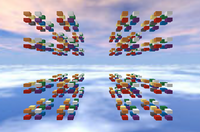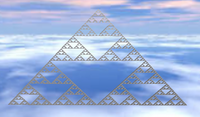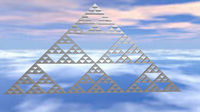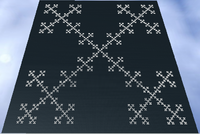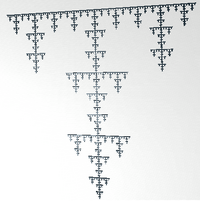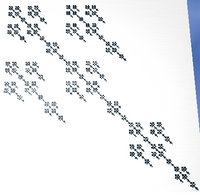Fractals: Difference between revisions
>Mindraker Flat images... there! That looks a lot better. |
>Mindraker No edit summary |
||
| (48 intermediate revisions by the same user not shown) | |||
| Line 33: | Line 33: | ||
p.Parent = game.Workspace | p.Parent = game.Workspace | ||
--wait(.1) | --wait(.1) | ||
end | |||
</pre> | |||
== 3D Sierpinsky Triangle == | |||
[[Image:3D Sierpinsky Triangle.PNG|thumb|3D Sierpinsky Triangle]] | |||
<b>WARNING</b> This can freeze up your computer. (My computer could only handle 5000 after about a <b>half hour</b>.) If you have a slow computer, reduce the "For" loop to a lower number, like 500, then work your way up to 1000. | |||
For a better picture of what this is, see the [http://en.wikipedia.org/wiki/Sierpi%C5%84ski_Triangle wikipedia article on Sierpinsky triangles] | |||
<pre> | |||
local x = 0 | |||
local y = 1.8 | |||
local z = 0 | |||
for i = 1, 5000 do | |||
a = math.random(1,8) | |||
if a == 1 then | |||
x = (x - 200)/2 | |||
y = (y - 200)/2 | |||
z = (z + 200)/2 | |||
end | |||
if a == 2 then | |||
x = (x + 200)/2 | |||
y = (y - 200)/2 | |||
z = (z + 200)/2 | |||
end | |||
if a == 3 then | |||
x = (x - 200)/2 | |||
y = (y - 200)/2 | |||
z = (z - 200)/2 | |||
end | |||
if a == 4 then | |||
x = (x + 200)/2 | |||
y = (y - 200)/2 | |||
z = (z - 200)/2 | |||
end | |||
if a == 5 then | |||
x = (x + 0)/2 | |||
y = (y + 200)/2 | |||
z = (z + 0)/2 | |||
end | |||
p = Instance.new("Part") | |||
p.CFrame = CFrame.new(Vector3.new(x,y,z)) | |||
p.Size = Vector3.new(1,1,1) | |||
p.Anchored = true | |||
p.Color = Color3.new(1) | |||
p.Parent = game.Workspace | |||
--wait(.1) | |||
end | |||
</pre> | |||
== Sierpinksy == | |||
[[Image:Srpnskythree.PNG|thumb|Sierpinsky]] | |||
This won't make a mathematical recreation of the Sierpinksy fractal, but it will merely make a pretty visual representation of it. | |||
<pre> | |||
x=1 | |||
y=1 | |||
for i = 50, 1, -1 do | |||
x=i | |||
y=(50-i) | |||
z=(50-i) | |||
p = Instance.new("Part") | |||
p.CFrame = CFrame.new(Vector3.new(1,i,1)) | |||
p.Size = Vector3.new(y,1,z) | |||
p.Anchored = true | |||
p.Color = Color3.new(1) | |||
p.Parent = game.Workspace | |||
--wait(1) | |||
end | |||
for i = 50, 1, -1 do | |||
x=i | |||
y=(50-i) | |||
z=(50-i) | |||
p = Instance.new("Part") | |||
p.CFrame = CFrame.new(Vector3.new(1+50,i,1+50)) | |||
p.Size = Vector3.new(y,1,z) | |||
p.Anchored = true | |||
p.Color = Color3.new(1) | |||
p.Parent = game.Workspace | |||
--wait(1) | |||
end | |||
for i = 50, 1, -1 do | |||
x=i | |||
y=(50-i) | |||
z=(50-i) | |||
p = Instance.new("Part") | |||
p.CFrame = CFrame.new(Vector3.new(1+50,i,1)) | |||
p.Size = Vector3.new(y,1,z) | |||
p.Anchored = true | |||
p.Color = Color3.new(1) | |||
p.Parent = game.Workspace | |||
--wait(1) | |||
end | |||
for i = 50, 1, -1 do | |||
x=i | |||
y=(50-i) | |||
z=(50-i) | |||
p = Instance.new("Part") | |||
p.CFrame = CFrame.new(Vector3.new(1,i,1+50)) | |||
p.Size = Vector3.new(y,1,z) | |||
p.Anchored = true | |||
p.Color = Color3.new(1) | |||
p.Parent = game.Workspace | |||
--wait(1) | |||
end | |||
for i = 50, 1, -1 do | |||
x=i | |||
y=(50-i) | |||
z=(50-i) | |||
p = Instance.new("Part") | |||
p.CFrame = CFrame.new(Vector3.new(1+25,i+50,1+25)) | |||
p.Size = Vector3.new(y,1,z) | |||
p.Anchored = true | |||
p.Color = Color3.new(1) | |||
p.Parent = game.Workspace | |||
--wait(1) | |||
end | end | ||
</pre> | </pre> | ||
| Line 76: | Line 224: | ||
p.Parent = game.Workspace | p.Parent = game.Workspace | ||
wait(.1) | wait(.1) | ||
end | |||
</pre> | |||
== Mandelbrot set == | |||
[[Image:Mandelbrot.PNG|thumb|Mandelbrot set]] | |||
This image requires the [[Output|Output window]] of Roblox studio. Thanks to [http://severinghaus.org/sites/severinghaus.org/files/luabrot.lua Serveringhaus.org] for this code. | |||
<pre> | |||
iter=100 | |||
esclim=2.0 | |||
ulx=-2.0 | |||
uly=1.0 | |||
lrx=1.0 | |||
lry=-1.0 | |||
width=70 | |||
height=40 | |||
function abs(x,y) | |||
return math.sqrt(x*x+y*y) | |||
end | |||
function escapeq(cx,cy) | |||
local zx=0.0 | |||
local zy=0.0 | |||
local i=0 | |||
while i<iter and abs(zx,zy)<esclim do | |||
tmp=zx*zx-zy*zy | |||
zy=2.0*zx*zy | |||
zx=tmp | |||
zx=zx+cx | |||
zy=zy+cy | |||
i=i+1 | |||
end | |||
return i<iter | |||
end | |||
for y=1,height do | |||
line='' | |||
for x=1,width do | |||
zx=ulx+(lrx-ulx)/width*x; | |||
zy=uly+(lry-uly)/height*y; | |||
if escapeq(zx,zy) then | |||
line=line..'.' | |||
else | |||
line=line..'#' | |||
end | |||
end | |||
print(line); | |||
end | |||
</pre> | |||
== Mandelbrot Brick Set == | |||
[[Image:Mandelbrot2.PNG|thumb|Brick version of the Mandelbrot Fractal]] | |||
This is almost identical to the script above, but it uses bricks instead of the [[Output|Output menu]]. | |||
<pre> | |||
iter=100 | |||
esclim=2.0 | |||
ulx=-2.0 | |||
uly=1.0 | |||
lrx=1.0 | |||
lry=-1.0 | |||
width=70 | |||
height=40 | |||
function abs(x,y) | |||
return math.sqrt(x*x+y*y) | |||
end | |||
function escapeq(cx,cy) | |||
local zx=0.0 | |||
local zy=0.0 | |||
local i=0 | |||
while i<iter and abs(zx,zy)<esclim do | |||
tmp=zx*zx-zy*zy | |||
zy=2.0*zx*zy | |||
zx=tmp | |||
zx=zx+cx | |||
zy=zy+cy | |||
i=i+1 | |||
end | |||
return i<iter | |||
end | |||
for y=1,height do | |||
for x=1,width do | |||
zx=ulx+(lrx-ulx)/width*x; | |||
zy=uly+(lry-uly)/height*y; | |||
if escapeq(zx,zy) then | |||
p = Instance.new("Part") | |||
p.CFrame = CFrame.new(Vector3.new(x,1.8,y)) | |||
p.Size = Vector3.new(1,1,1) | |||
p.Anchored = true | |||
p.Color = Color3.new(1) | |||
p.Parent = game.Workspace | |||
--wait(.1) | |||
else | |||
p = Instance.new("Part") | |||
p.CFrame = CFrame.new(Vector3.new(x,1.8,y)) | |||
p.Size = Vector3.new(1,1,1) | |||
p.Anchored = true | |||
--p.Color = Color3.new(2) | |||
p.Parent = game.Workspace | |||
--wait(.1) | |||
end | |||
end | |||
end | end | ||
</pre> | </pre> | ||
| Line 118: | Line 382: | ||
--wait(.1) | --wait(.1) | ||
end | end | ||
</pre> | |||
== 3D Cantor set == | |||
[[Image:3d cantor set2.PNG|thumb|3D Cantor set]] | |||
<b>WARNING</b> This can freeze up your computer. If you have a slow computer, reduce the "For" loop to a lower number, like 500, then work your way up to 1000. | |||
<pre> | |||
local x = 0 | |||
local y = 1.8 | |||
local z = 0 | |||
for i = 1, 2000 do | |||
a = math.random(1,8) | |||
if a == 1 then | |||
x = (x - 250)/3 | |||
y = (y - 250)/3 | |||
z = (z - 250)/3 | |||
end | |||
if a == 2 then | |||
x = (x - 250)/3 | |||
y = (y - 250)/3 | |||
z = (z + 250)/3 | |||
end | |||
if a == 3 then | |||
x = (x - 250)/3 | |||
y = (y + 250)/3 | |||
z = (z - 250)/3 | |||
end | |||
if a == 4 then | |||
x = (x - 250)/3 | |||
y = (y + 250)/3 | |||
z = (z + 250)/3 | |||
end | |||
if a == 5 then | |||
x = (x + 250)/3 | |||
y = (y + 250)/3 | |||
z = (z + 250)/3 | |||
end | |||
if a == 6 then | |||
x = (x + 250)/3 | |||
y = (y - 250)/3 | |||
z = (z + 250)/3 | |||
end | |||
if a == 7 then | |||
x = (x + 250)/3 | |||
y = (y + 250)/3 | |||
z = (z - 250)/3 | |||
end | |||
if a == 8 then | |||
x = (x + 250)/3 | |||
y = (y - 250)/3 | |||
z = (z - 250)/3 | |||
end | |||
p = Instance.new("Part") | |||
p.CFrame = CFrame.new(Vector3.new(x,y,z)) | |||
p.Size = Vector3.new(1,1,1) | |||
p.Anchored = true | |||
p.Color = Color3.new(1) | |||
p.Parent = game.Workspace | |||
--wait(.1) | |||
end | |||
</pre> | |||
== 3D Cantor set 2 == | |||
[[Image:3d cantor set3.PNG|thumb|3D Cantor set]] | |||
This is a proportional representation of the 3D Cantor set. | |||
<pre> | |||
p = Instance.new("Part") | |||
p.CFrame = CFrame.new(Vector3.new(1,17,1)) | |||
p.Size = Vector3.new(33,33,33) | |||
p.Anchored = true | |||
p.Color = Color3.new(1) | |||
p.Parent = game.Workspace | |||
p = Instance.new("Part") | |||
p.CFrame = CFrame.new(Vector3.new(1+66,17,1+66)) | |||
p.Size = Vector3.new(33,33,33) | |||
p.Anchored = true | |||
p.Color = Color3.new(1) | |||
p.Parent = game.Workspace | |||
p = Instance.new("Part") | |||
p.CFrame = CFrame.new(Vector3.new(1+66,17,1)) | |||
p.Size = Vector3.new(33,33,33) | |||
p.Anchored = true | |||
p.Color = Color3.new(1) | |||
p.Parent = game.Workspace | |||
p = Instance.new("Part") | |||
p.CFrame = CFrame.new(Vector3.new(1,17,1+66)) | |||
p.Size = Vector3.new(33,33,33) | |||
p.Anchored = true | |||
p.Color = Color3.new(1) | |||
p.Parent = game.Workspace | |||
p = Instance.new("Part") | |||
p.CFrame = CFrame.new(Vector3.new(1+66,17+66,1+66)) | |||
p.Size = Vector3.new(33,33,33) | |||
p.Anchored = true | |||
p.Color = Color3.new(1) | |||
p.Parent = game.Workspace | |||
p = Instance.new("Part") | |||
p.CFrame = CFrame.new(Vector3.new(1,17+66,1+66)) | |||
p.Size = Vector3.new(33,33,33) | |||
p.Anchored = true | |||
p.Color = Color3.new(1) | |||
p.Parent = game.Workspace | |||
p = Instance.new("Part") | |||
p.CFrame = CFrame.new(Vector3.new(1+66,17+66,1)) | |||
p.Size = Vector3.new(33,33,33) | |||
p.Anchored = true | |||
p.Color = Color3.new(1) | |||
p.Parent = game.Workspace | |||
p = Instance.new("Part") | |||
p.CFrame = CFrame.new(Vector3.new(1,17+66,1)) | |||
p.Size = Vector3.new(33,33,33) | |||
p.Anchored = true | |||
p.Color = Color3.new(1) | |||
p.Parent = game.Workspace | |||
</pre> | </pre> | ||
| Line 205: | Line 605: | ||
x = (x - 350)/5 | x = (x - 350)/5 | ||
z = (z + 5)/5 | z = (z + 5)/5 | ||
end | |||
p = Instance.new("Part") | |||
p.CFrame = CFrame.new(Vector3.new(x,1.8,z)) | |||
p.Size = Vector3.new(1,1,1) | |||
p.Anchored = true | |||
p.Color = Color3.new(1) | |||
p.Parent = game.Workspace | |||
--wait(.1) | |||
end | |||
</pre> | |||
== Quadratic Koch, 2nd iteration == | |||
[[Image:Quadratic Koch w script.PNG|thumb|Quadratic Koch, 3D (type 1), 2nd iteration]] | |||
This doesn't get into the math behind it. See [http://commons.wikimedia.org/wiki/File:Quadratic_Koch_3D_(type1).png wikipedia] for more info. | |||
<pre> | |||
p = Instance.new("Part") | |||
p.CFrame = CFrame.new(Vector3.new(1,16.2,0)) | |||
p.Size = Vector3.new(30,30,30) | |||
p.Anchored = true | |||
p.Color = Color3.new(0) | |||
p.formFactor = "Symmetric" | |||
p.Parent = game.Workspace | |||
p = Instance.new("Part") | |||
p.CFrame = CFrame.new(Vector3.new(0,21,0)) | |||
p.Size = Vector3.new(10,10,10) | |||
p.Anchored = true | |||
p.Color = Color3.new(1) | |||
p.Parent = game.Workspace | |||
p.formFactor = "Symmetric" | |||
p = Instance.new("Part") | |||
p.CFrame = CFrame.new(Vector3.new(0,16.2,20)) | |||
p.Size = Vector3.new(10,10,10) | |||
p.Anchored = true | |||
p.Color = Color3.new(1) | |||
p.Parent = game.Workspace | |||
p.formFactor = "Symmetric" | |||
p = Instance.new("Part") | |||
p.CFrame = CFrame.new(Vector3.new(21,16.2,0)) | |||
p.Size = Vector3.new(10,10,10) | |||
p.Anchored = true | |||
p.Color = Color3.new(1) | |||
p.Parent = game.Workspace | |||
p.formFactor = "Symmetric" | |||
p = Instance.new("Part") | |||
p.CFrame = CFrame.new(Vector3.new(-19,16.2,0)) | |||
p.Size = Vector3.new(10,10,10) | |||
p.Anchored = true | |||
p.Color = Color3.new(1) | |||
p.Parent = game.Workspace | |||
p.formFactor = "Symmetric" | |||
p = Instance.new("Part") | |||
p.CFrame = CFrame.new(Vector3.new(0,16.2,-20)) | |||
p.Size = Vector3.new(10,10,10) | |||
p.Anchored = true | |||
p.Color = Color3.new(1) | |||
p.Parent = game.Workspace | |||
p.formFactor = "Symmetric" | |||
p = Instance.new("Part") | |||
p.CFrame = CFrame.new(Vector3.new(0,6.2,30)) | |||
p.Size = Vector3.new(10,10,10) | |||
p.Anchored = true | |||
p.Color = Color3.new(1) | |||
p.Parent = game.Workspace | |||
p.formFactor = "Symmetric" | |||
p = Instance.new("Part") | |||
p.CFrame = CFrame.new(Vector3.new(-29, 6.2, 0)) | |||
p.Size = Vector3.new(10,10,10) | |||
p.Anchored = true | |||
p.Color = Color3.new(1) | |||
p.Parent = game.Workspace | |||
p.formFactor = "Symmetric" | |||
p = Instance.new("Part") | |||
p.CFrame = CFrame.new(Vector3.new(0, 6.2, -30)) | |||
p.Size = Vector3.new(10,10,10) | |||
p.Anchored = true | |||
p.Color = Color3.new(1) | |||
p.Parent = game.Workspace | |||
p.formFactor = "Symmetric" | |||
p = Instance.new("Part") | |||
p.CFrame = CFrame.new(Vector3.new(31, 6.2, 0)) | |||
p.Size = Vector3.new(10,10,10) | |||
p.Anchored = true | |||
p.Color = Color3.new(1) | |||
p.Parent = game.Workspace | |||
p.formFactor = "Symmetric" | |||
p = Instance.new("Part") | |||
p.CFrame = CFrame.new(Vector3.new(31, 6.2, -30)) | |||
p.Size = Vector3.new(10,10,10) | |||
p.Anchored = true | |||
p.Color = Color3.new(1) | |||
p.Parent = game.Workspace | |||
p.formFactor = "Symmetric" | |||
p = Instance.new("Part") | |||
p.CFrame = CFrame.new(Vector3.new(-30, 6.2, -30)) | |||
p.Size = Vector3.new(10,10,10) | |||
p.Anchored = true | |||
p.Color = Color3.new(1) | |||
p.Parent = game.Workspace | |||
p.formFactor = "Symmetric" | |||
p = Instance.new("Part") | |||
p.CFrame = CFrame.new(Vector3.new(-29, 6.2, 30)) | |||
p.Size = Vector3.new(10,10,10) | |||
p.Anchored = true | |||
p.Color = Color3.new(1) | |||
p.Parent = game.Workspace | |||
p.formFactor = "Symmetric" | |||
p = Instance.new("Part") | |||
p.CFrame = CFrame.new(Vector3.new(30, 6.2, 30)) | |||
p.Size = Vector3.new(10,10,10) | |||
p.Anchored = true | |||
p.Color = Color3.new(1) | |||
p.Parent = game.Workspace | |||
p.formFactor = "Symmetric" | |||
</pre> | |||
== Vicsek Fractal == | |||
[[Image:Fractal28dec2008.PNG|thumb|I don't know why the middle is kicked off at an angle]] | |||
<pre> | |||
x = 50 | |||
y = 1.8 | |||
z = 50 | |||
for i = 1, 1000, 1 do | |||
a = math.random(1,5) | |||
if a == 1 then | |||
x = .33*x - 66 | |||
z = .33*z + 66 | |||
end | |||
if a == 2 then | |||
x = .325*x +.325*z | |||
z = -.325*x+.325*z | |||
end | |||
if a == 3 then | |||
x = .33*x - 66 | |||
z = .33*z - 66 | |||
end | |||
if a == 4 then | |||
x = .33*x + 66 | |||
z = .33*z - 66 | |||
end | |||
if a == 5 then | |||
x = .33*x + 66 | |||
z = .33*z + 66 | |||
end | |||
p = Instance.new("Part") | |||
p.CFrame = CFrame.new(Vector3.new(x,1.8,z)) | |||
p.Size = Vector3.new(1,1,1) | |||
p.Anchored = true | |||
p.Color = Color3.new(1) | |||
p.Parent = game.Workspace | |||
--wait(.1) | |||
end | |||
</pre> | |||
== Fractal from my old calculus book == | |||
I don't know the name of this one. It's lopsided for some reason. | |||
[[Image:Fractal28dec2008b.PNG|thumb|fractal from my old calculus book]] | |||
<pre> | |||
x = 50 | |||
y = 1.8 | |||
z = 50 | |||
for i = 1, 2000, 1 do | |||
a = math.random(1,5) | |||
if a == 1 then | |||
x = (.25*x) - 25 | |||
z = .25*z + 25 | |||
end | |||
if a == 2 then | |||
x = .288*x -(.167*z) - 50 | |||
z = .167*x +.288*z - 50 | |||
end | |||
if a == 3 then | |||
x = (.25*x)-74.6 | |||
z = .25*z+74.6 | |||
end | |||
if a == 4 then | |||
x = .5*x+50 | |||
z = .5*z-50 | |||
end | |||
if a == 5 then | |||
x = .18*x+.174*z+50 | |||
z = (-.174*x)+.18*z+50 | |||
end | end | ||
| Line 220: | Line 839: | ||
[[Image:Cantor3d.PNG|200px|3D Cantor dust]] [[Image:Quadratic Koch 3D (type1 stage3).PNG|200px|Third iteration of 3D Koch quadratic fractal]] [[Image:Square koch 3.PNG|200px|Square koch 3]] <br> | [[Image:Cantor3d.PNG|200px|3D Cantor dust]] [[Image:Quadratic Koch 3D (type1 stage3).PNG|200px|Third iteration of 3D Koch quadratic fractal]] [[Image:Square koch 3.PNG|200px|Square koch 3]] <br> | ||
[[Image:Sierpinskytriangle.PNG|200px|Sierpinsky triangle fractal]] [[Image:Snskytwo.PNG|200px|Variation of the Sierpinsky triangle fractal]] [[Image:Fractalx.PNG|200px|Vicsek fractal]] <br> [[Image:FractalT.PNG|200px|Fractal T]] [[Image:Fractal kite.PNG|200px|Fractal kite]] | [[Image:Sierpinskytriangle.PNG|200px|Sierpinsky triangle fractal]] [[Image:Snskytwo.PNG|200px|Variation of the Sierpinsky triangle fractal]] [[Image:Fractalx.PNG|200px|Vicsek fractal]]<br> [[Image:FractalT.PNG|200px|Fractal T]] [[Image:Fractal kite.PNG|200px|Fractal kite]] | ||
== See Also == | == See Also == | ||
| Line 227: | Line 846: | ||
[http://www1.hollins.edu/homepages/hammerpw/SKMDAY/beauty.htm Beauty in Mathematics, an introductory article on fractals with helpful images] | [http://www1.hollins.edu/homepages/hammerpw/SKMDAY/beauty.htm Beauty in Mathematics, an introductory article on fractals with helpful images] | ||
[[Category:Player Created]] | |||
Latest revision as of 09:02, 29 December 2008
Sierpinsky Triangle
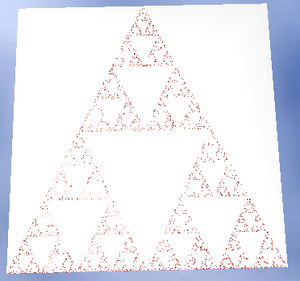
x = 0
y = 1.8
z = 0
for i = 1, 4000 do
a = math.random(1,3)
if a == 1 then
x = x / 2
z = (z - 250)/2
end
if a == 2 then
x = (x - 250)/2
z = (z + 250)/2
end
if a == 3 then
x = (x + 250)/2
z = (z + 250)/2
end
p = Instance.new("Part")
p.CFrame = CFrame.new(Vector3.new(x,1.8,z))
p.Size = Vector3.new(1,1,1)
p.Anchored = true
p.Color = Color3.new(1)
p.Parent = game.Workspace
--wait(.1)
end
3D Sierpinsky Triangle
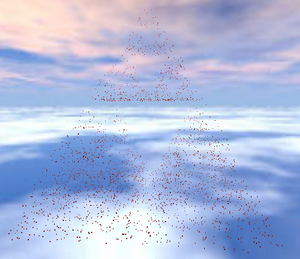
WARNING This can freeze up your computer. (My computer could only handle 5000 after about a half hour.) If you have a slow computer, reduce the "For" loop to a lower number, like 500, then work your way up to 1000.
For a better picture of what this is, see the wikipedia article on Sierpinsky triangles
local x = 0
local y = 1.8
local z = 0
for i = 1, 5000 do
a = math.random(1,8)
if a == 1 then
x = (x - 200)/2
y = (y - 200)/2
z = (z + 200)/2
end
if a == 2 then
x = (x + 200)/2
y = (y - 200)/2
z = (z + 200)/2
end
if a == 3 then
x = (x - 200)/2
y = (y - 200)/2
z = (z - 200)/2
end
if a == 4 then
x = (x + 200)/2
y = (y - 200)/2
z = (z - 200)/2
end
if a == 5 then
x = (x + 0)/2
y = (y + 200)/2
z = (z + 0)/2
end
p = Instance.new("Part")
p.CFrame = CFrame.new(Vector3.new(x,y,z))
p.Size = Vector3.new(1,1,1)
p.Anchored = true
p.Color = Color3.new(1)
p.Parent = game.Workspace
--wait(.1)
end
Sierpinksy
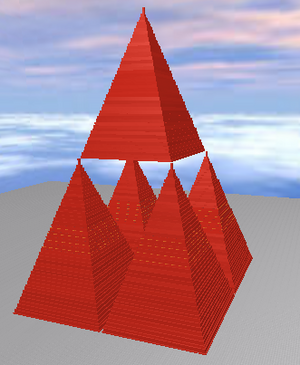
This won't make a mathematical recreation of the Sierpinksy fractal, but it will merely make a pretty visual representation of it.
x=1
y=1
for i = 50, 1, -1 do
x=i
y=(50-i)
z=(50-i)
p = Instance.new("Part")
p.CFrame = CFrame.new(Vector3.new(1,i,1))
p.Size = Vector3.new(y,1,z)
p.Anchored = true
p.Color = Color3.new(1)
p.Parent = game.Workspace
--wait(1)
end
for i = 50, 1, -1 do
x=i
y=(50-i)
z=(50-i)
p = Instance.new("Part")
p.CFrame = CFrame.new(Vector3.new(1+50,i,1+50))
p.Size = Vector3.new(y,1,z)
p.Anchored = true
p.Color = Color3.new(1)
p.Parent = game.Workspace
--wait(1)
end
for i = 50, 1, -1 do
x=i
y=(50-i)
z=(50-i)
p = Instance.new("Part")
p.CFrame = CFrame.new(Vector3.new(1+50,i,1))
p.Size = Vector3.new(y,1,z)
p.Anchored = true
p.Color = Color3.new(1)
p.Parent = game.Workspace
--wait(1)
end
for i = 50, 1, -1 do
x=i
y=(50-i)
z=(50-i)
p = Instance.new("Part")
p.CFrame = CFrame.new(Vector3.new(1,i,1+50))
p.Size = Vector3.new(y,1,z)
p.Anchored = true
p.Color = Color3.new(1)
p.Parent = game.Workspace
--wait(1)
end
for i = 50, 1, -1 do
x=i
y=(50-i)
z=(50-i)
p = Instance.new("Part")
p.CFrame = CFrame.new(Vector3.new(1+25,i+50,1+25))
p.Size = Vector3.new(y,1,z)
p.Anchored = true
p.Color = Color3.new(1)
p.Parent = game.Workspace
--wait(1)
end
Fern leaf
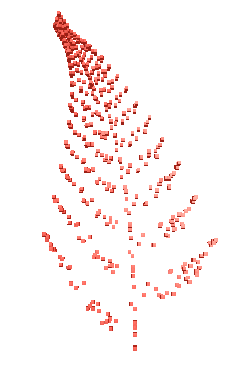
x = 1
y = 1.8
z = 1
for i = 1, 500 do
a = math.random(1,100)
if a == 1 then
x = 0
z = (0.16*z)
elseif a > 1 and a <= 8 then
x = ((0.20*x) - (0.26*z))
z= (0.23*x + 0.22*z + 16)
elseif a > 8 and a <= 15 then
x = ((-0.15*x) + 0.28*z)
z = (0.26*x + 0.24*z + 4.4)
elseif a > 15 and a <= 100 then
x = 0.85*x + 0.04*z
z = ((-0.04*x) + 0.85*z + 16)
end
p = Instance.new("Part")
p.CFrame = CFrame.new(Vector3.new(x,1.8,z))
p.Size = Vector3.new(1,1,1)
p.Anchored = true
p.Color = Color3.new(1)
p.Parent = game.Workspace
wait(.1)
end
Mandelbrot set
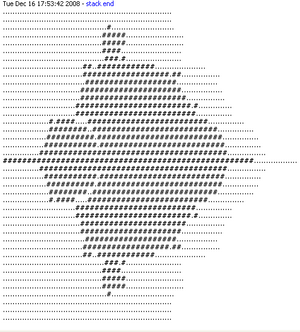
This image requires the Output window of Roblox studio. Thanks to Serveringhaus.org for this code.
iter=100
esclim=2.0
ulx=-2.0
uly=1.0
lrx=1.0
lry=-1.0
width=70
height=40
function abs(x,y)
return math.sqrt(x*x+y*y)
end
function escapeq(cx,cy)
local zx=0.0
local zy=0.0
local i=0
while i<iter and abs(zx,zy)<esclim do
tmp=zx*zx-zy*zy
zy=2.0*zx*zy
zx=tmp
zx=zx+cx
zy=zy+cy
i=i+1
end
return i<iter
end
for y=1,height do
line=''
for x=1,width do
zx=ulx+(lrx-ulx)/width*x;
zy=uly+(lry-uly)/height*y;
if escapeq(zx,zy) then
line=line..'.'
else
line=line..'#'
end
end
print(line);
end
Mandelbrot Brick Set
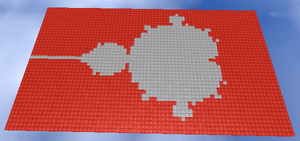
This is almost identical to the script above, but it uses bricks instead of the Output menu.
iter=100
esclim=2.0
ulx=-2.0
uly=1.0
lrx=1.0
lry=-1.0
width=70
height=40
function abs(x,y)
return math.sqrt(x*x+y*y)
end
function escapeq(cx,cy)
local zx=0.0
local zy=0.0
local i=0
while i<iter and abs(zx,zy)<esclim do
tmp=zx*zx-zy*zy
zy=2.0*zx*zy
zx=tmp
zx=zx+cx
zy=zy+cy
i=i+1
end
return i<iter
end
for y=1,height do
for x=1,width do
zx=ulx+(lrx-ulx)/width*x;
zy=uly+(lry-uly)/height*y;
if escapeq(zx,zy) then
p = Instance.new("Part")
p.CFrame = CFrame.new(Vector3.new(x,1.8,y))
p.Size = Vector3.new(1,1,1)
p.Anchored = true
p.Color = Color3.new(1)
p.Parent = game.Workspace
--wait(.1)
else
p = Instance.new("Part")
p.CFrame = CFrame.new(Vector3.new(x,1.8,y))
p.Size = Vector3.new(1,1,1)
p.Anchored = true
--p.Color = Color3.new(2)
p.Parent = game.Workspace
--wait(.1)
end
end
end
Cantor set
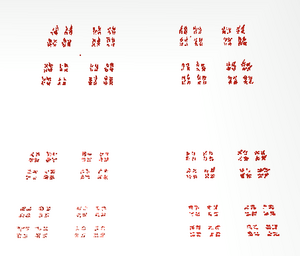
x = 0
y = 1.8
z = 0
for i = 1, 3000 do
a = math.random(1,4)
if a == 1 then
x = (x - 250)/3
z = (z - 250)/3
end
if a == 2 then
x = (x - 250)/3
z = (z + 250)/3
end
if a == 3 then
x = (x + 250)/3
z = (z + 250)/3
end
if a == 4 then
x = (x + 250)/3
z = (z - 250)/3
end
p = Instance.new("Part")
p.CFrame = CFrame.new(Vector3.new(x,1.8,z))
p.Size = Vector3.new(1,1,1)
p.Anchored = true
p.Color = Color3.new(1)
p.Parent = game.Workspace
--wait(.1)
end
3D Cantor set
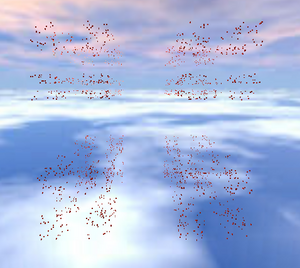
WARNING This can freeze up your computer. If you have a slow computer, reduce the "For" loop to a lower number, like 500, then work your way up to 1000.
local x = 0
local y = 1.8
local z = 0
for i = 1, 2000 do
a = math.random(1,8)
if a == 1 then
x = (x - 250)/3
y = (y - 250)/3
z = (z - 250)/3
end
if a == 2 then
x = (x - 250)/3
y = (y - 250)/3
z = (z + 250)/3
end
if a == 3 then
x = (x - 250)/3
y = (y + 250)/3
z = (z - 250)/3
end
if a == 4 then
x = (x - 250)/3
y = (y + 250)/3
z = (z + 250)/3
end
if a == 5 then
x = (x + 250)/3
y = (y + 250)/3
z = (z + 250)/3
end
if a == 6 then
x = (x + 250)/3
y = (y - 250)/3
z = (z + 250)/3
end
if a == 7 then
x = (x + 250)/3
y = (y + 250)/3
z = (z - 250)/3
end
if a == 8 then
x = (x + 250)/3
y = (y - 250)/3
z = (z - 250)/3
end
p = Instance.new("Part")
p.CFrame = CFrame.new(Vector3.new(x,y,z))
p.Size = Vector3.new(1,1,1)
p.Anchored = true
p.Color = Color3.new(1)
p.Parent = game.Workspace
--wait(.1)
end
3D Cantor set 2
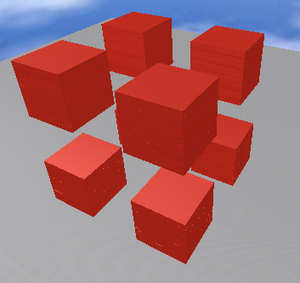
This is a proportional representation of the 3D Cantor set.
p = Instance.new("Part")
p.CFrame = CFrame.new(Vector3.new(1,17,1))
p.Size = Vector3.new(33,33,33)
p.Anchored = true
p.Color = Color3.new(1)
p.Parent = game.Workspace
p = Instance.new("Part")
p.CFrame = CFrame.new(Vector3.new(1+66,17,1+66))
p.Size = Vector3.new(33,33,33)
p.Anchored = true
p.Color = Color3.new(1)
p.Parent = game.Workspace
p = Instance.new("Part")
p.CFrame = CFrame.new(Vector3.new(1+66,17,1))
p.Size = Vector3.new(33,33,33)
p.Anchored = true
p.Color = Color3.new(1)
p.Parent = game.Workspace
p = Instance.new("Part")
p.CFrame = CFrame.new(Vector3.new(1,17,1+66))
p.Size = Vector3.new(33,33,33)
p.Anchored = true
p.Color = Color3.new(1)
p.Parent = game.Workspace
p = Instance.new("Part")
p.CFrame = CFrame.new(Vector3.new(1+66,17+66,1+66))
p.Size = Vector3.new(33,33,33)
p.Anchored = true
p.Color = Color3.new(1)
p.Parent = game.Workspace
p = Instance.new("Part")
p.CFrame = CFrame.new(Vector3.new(1,17+66,1+66))
p.Size = Vector3.new(33,33,33)
p.Anchored = true
p.Color = Color3.new(1)
p.Parent = game.Workspace
p = Instance.new("Part")
p.CFrame = CFrame.new(Vector3.new(1+66,17+66,1))
p.Size = Vector3.new(33,33,33)
p.Anchored = true
p.Color = Color3.new(1)
p.Parent = game.Workspace
p = Instance.new("Part")
p.CFrame = CFrame.new(Vector3.new(1,17+66,1))
p.Size = Vector3.new(33,33,33)
p.Anchored = true
p.Color = Color3.new(1)
p.Parent = game.Workspace
Untitled
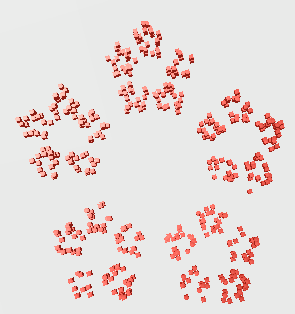
x = 68
y = 1.8
z = 56
for i = 1, 500 do
a = math.random(1,5)
if a == 1 then
x = x / 3
z = (z - 57)/3
end
if a == 2 then
x = (x + 68)/3
z = (z - 13)/3
end
if a == 3 then
x = (x + 42)/3
z = (z + 58)/3
end
if a == 4 then
x = (x - 42)/3
z = (z + 58)/3
end
if a == 5 then
x = (x - 68)/3
z = (z - 13)/3
end
p = Instance.new("Part")
p.CFrame = CFrame.new(Vector3.new(x,1.8,z))
p.Size = Vector3.new(1,1,1)
p.Anchored = true
p.Color = Color3.new(1)
p.Parent = game.Workspace
--wait(.1)
end
Untitled2
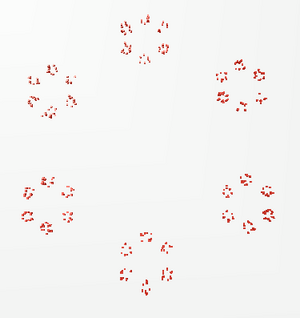
x = 82
y = 1.8
z = 30
for i = 1, 500 do
a = math.random(1,6)
if a == 1 then
x = (x - 185)/5
z = (z - 300)/5
end
if a == 2 then
x = (x + 180)/5
z = (z - 300)/5
end
if a == 3 then
x = (x + 345)/5
z = (z + 5)/5
end
if a == 4 then
x = (x + 175)/5
z = (z + 300)/5
end
if a == 5 then
x = (x - 180)/5
z = (z + 300)/5
end
if a == 6 then
x = (x - 350)/5
z = (z + 5)/5
end
p = Instance.new("Part")
p.CFrame = CFrame.new(Vector3.new(x,1.8,z))
p.Size = Vector3.new(1,1,1)
p.Anchored = true
p.Color = Color3.new(1)
p.Parent = game.Workspace
--wait(.1)
end
Quadratic Koch, 2nd iteration
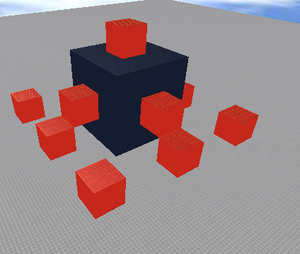
This doesn't get into the math behind it. See wikipedia for more info.
p = Instance.new("Part")
p.CFrame = CFrame.new(Vector3.new(1,16.2,0))
p.Size = Vector3.new(30,30,30)
p.Anchored = true
p.Color = Color3.new(0)
p.formFactor = "Symmetric"
p.Parent = game.Workspace
p = Instance.new("Part")
p.CFrame = CFrame.new(Vector3.new(0,21,0))
p.Size = Vector3.new(10,10,10)
p.Anchored = true
p.Color = Color3.new(1)
p.Parent = game.Workspace
p.formFactor = "Symmetric"
p = Instance.new("Part")
p.CFrame = CFrame.new(Vector3.new(0,16.2,20))
p.Size = Vector3.new(10,10,10)
p.Anchored = true
p.Color = Color3.new(1)
p.Parent = game.Workspace
p.formFactor = "Symmetric"
p = Instance.new("Part")
p.CFrame = CFrame.new(Vector3.new(21,16.2,0))
p.Size = Vector3.new(10,10,10)
p.Anchored = true
p.Color = Color3.new(1)
p.Parent = game.Workspace
p.formFactor = "Symmetric"
p = Instance.new("Part")
p.CFrame = CFrame.new(Vector3.new(-19,16.2,0))
p.Size = Vector3.new(10,10,10)
p.Anchored = true
p.Color = Color3.new(1)
p.Parent = game.Workspace
p.formFactor = "Symmetric"
p = Instance.new("Part")
p.CFrame = CFrame.new(Vector3.new(0,16.2,-20))
p.Size = Vector3.new(10,10,10)
p.Anchored = true
p.Color = Color3.new(1)
p.Parent = game.Workspace
p.formFactor = "Symmetric"
p = Instance.new("Part")
p.CFrame = CFrame.new(Vector3.new(0,6.2,30))
p.Size = Vector3.new(10,10,10)
p.Anchored = true
p.Color = Color3.new(1)
p.Parent = game.Workspace
p.formFactor = "Symmetric"
p = Instance.new("Part")
p.CFrame = CFrame.new(Vector3.new(-29, 6.2, 0))
p.Size = Vector3.new(10,10,10)
p.Anchored = true
p.Color = Color3.new(1)
p.Parent = game.Workspace
p.formFactor = "Symmetric"
p = Instance.new("Part")
p.CFrame = CFrame.new(Vector3.new(0, 6.2, -30))
p.Size = Vector3.new(10,10,10)
p.Anchored = true
p.Color = Color3.new(1)
p.Parent = game.Workspace
p.formFactor = "Symmetric"
p = Instance.new("Part")
p.CFrame = CFrame.new(Vector3.new(31, 6.2, 0))
p.Size = Vector3.new(10,10,10)
p.Anchored = true
p.Color = Color3.new(1)
p.Parent = game.Workspace
p.formFactor = "Symmetric"
p = Instance.new("Part")
p.CFrame = CFrame.new(Vector3.new(31, 6.2, -30))
p.Size = Vector3.new(10,10,10)
p.Anchored = true
p.Color = Color3.new(1)
p.Parent = game.Workspace
p.formFactor = "Symmetric"
p = Instance.new("Part")
p.CFrame = CFrame.new(Vector3.new(-30, 6.2, -30))
p.Size = Vector3.new(10,10,10)
p.Anchored = true
p.Color = Color3.new(1)
p.Parent = game.Workspace
p.formFactor = "Symmetric"
p = Instance.new("Part")
p.CFrame = CFrame.new(Vector3.new(-29, 6.2, 30))
p.Size = Vector3.new(10,10,10)
p.Anchored = true
p.Color = Color3.new(1)
p.Parent = game.Workspace
p.formFactor = "Symmetric"
p = Instance.new("Part")
p.CFrame = CFrame.new(Vector3.new(30, 6.2, 30))
p.Size = Vector3.new(10,10,10)
p.Anchored = true
p.Color = Color3.new(1)
p.Parent = game.Workspace
p.formFactor = "Symmetric"
Vicsek Fractal
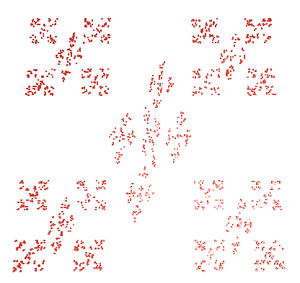
x = 50
y = 1.8
z = 50
for i = 1, 1000, 1 do
a = math.random(1,5)
if a == 1 then
x = .33*x - 66
z = .33*z + 66
end
if a == 2 then
x = .325*x +.325*z
z = -.325*x+.325*z
end
if a == 3 then
x = .33*x - 66
z = .33*z - 66
end
if a == 4 then
x = .33*x + 66
z = .33*z - 66
end
if a == 5 then
x = .33*x + 66
z = .33*z + 66
end
p = Instance.new("Part")
p.CFrame = CFrame.new(Vector3.new(x,1.8,z))
p.Size = Vector3.new(1,1,1)
p.Anchored = true
p.Color = Color3.new(1)
p.Parent = game.Workspace
--wait(.1)
end
Fractal from my old calculus book
I don't know the name of this one. It's lopsided for some reason.
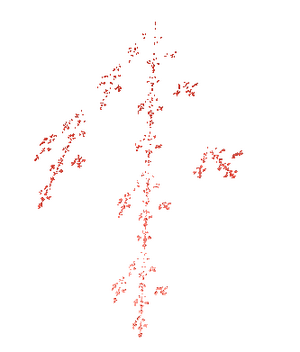
x = 50
y = 1.8
z = 50
for i = 1, 2000, 1 do
a = math.random(1,5)
if a == 1 then
x = (.25*x) - 25
z = .25*z + 25
end
if a == 2 then
x = .288*x -(.167*z) - 50
z = .167*x +.288*z - 50
end
if a == 3 then
x = (.25*x)-74.6
z = .25*z+74.6
end
if a == 4 then
x = .5*x+50
z = .5*z-50
end
if a == 5 then
x = .18*x+.174*z+50
z = (-.174*x)+.18*z+50
end
p = Instance.new("Part")
p.CFrame = CFrame.new(Vector3.new(x,1.8,z))
p.Size = Vector3.new(1,1,1)
p.Anchored = true
p.Color = Color3.new(1)
p.Parent = game.Workspace
--wait(.1)
end
Other Roblox Fractal images
See Also
Beauty in Mathematics, an introductory article on fractals with helpful images
